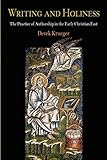Writing and Holiness : The Practice of Authorship in the Early Christian East / Derek Krueger.
Material type: TextSeries: Divinations: Rereading Late Ancient ReligionPublisher: Philadelphia : University of Pennsylvania Press, [2013]Copyright date: ©2004Description: 1 online resource (312 p.) : 11 illusContent type:
TextSeries: Divinations: Rereading Late Ancient ReligionPublisher: Philadelphia : University of Pennsylvania Press, [2013]Copyright date: ©2004Description: 1 online resource (312 p.) : 11 illusContent type: - 9780812221473
- 9780812202533
- 270.2
- online - DeGruyter
| Item type | Current library | Call number | URL | Status | Notes | Barcode | |
|---|---|---|---|---|---|---|---|
 eBook
eBook
|
Biblioteca "Angelicum" Pont. Univ. S.Tommaso d'Aquino Nuvola online | online - DeGruyter (Browse shelf(Opens below)) | Online access | Not for loan (Accesso limitato) | Accesso per gli utenti autorizzati / Access for authorized users | (dgr)9780812202533 |
Frontmatter -- Contents -- Chapter 1. Literary Composition as a Religious Activity -- Chapter 2. Typology and Hagiography: Theodoret of Cyrrhus’s Religious History -- Chapter 3. Biblical Authors: The Evangelists as Saints -- Chapter 4. Hagiography as Devotion: Writing in the Cult of the Saints -- Chapter 5. Hagiography as Asceticism: Humility as Authorial Practice -- Chapter 6. Hagiography as Liturgy: Writing and Memory in Gregory of Nyssa’s Life of Macrina -- Chapter 7. Textual Bodies: Plotinus, Syncletica, and the Teaching of Addai -- Chapter 8. Textuality and Redemption: The Hymns of Romanos the Melodist -- Chapter 9. Hagiographical Practice and the Formation of Identity: Genre and Discipline -- Abbreviations -- Notes -- Bibliography -- Index -- Acknowledgments
restricted access online access with authorization star
http://purl.org/coar/access_right/c_16ec
Drawing on comparative literature, ritual and performance studies, and the history of asceticism, Derek Krueger explores how early Christian writers came to view writing as salvific, as worship through the production of art. Exploring the emergence of new and distinctly Christian ideas about authorship in late antiquity, Writing and Holiness probes saints' lives and hymns produced in the Greek East to reveal how the ascetic call to imitate Christ's humility rendered artistic and literary creativity problematic. In claiming authority and power, hagiographers appeared to violate the saintly practices that they sought to promote. Christian writers meditated within their texts on these tensions and ultimately developed a new set of answers to the question "What is an author?"Each of the texts examined here used writing as a technique for the representation of holiness. Some are narrative representations of saints that facilitate veneration; others are collections of accounts of miracles, composed to publicize a shrine. Rather than viewing an author's piety as a barrier to historical inquiry, Krueger argues that consideration of writing as a form of piety opens windows onto new modes of practice. He interprets Christian authors as participants in the religious system they described, as devotees, monastics, and faithful emulators of the saints, and he shows how their literary practice integrated authorship into other Christian practices, such as asceticism, devotion, pilgrimage, liturgy, and sacrifice. In considering the distinctly literary contributions to the formation of Christian piety in late antiquity, Writing and Holiness uncovers Christian literary theories with implications for both Eastern and Western medieval literatures.
Mode of access: Internet via World Wide Web.
In English.
Description based on online resource; title from PDF title page (publisher's Web site, viewed 08. Aug 2023)


